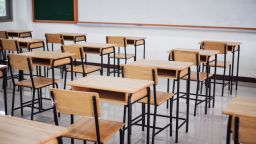Editor’s Note: Holly Thomas is a writer and editor based in London. She tweets @HolstaT. The opinions expressed in this commentary are solely those of the author. View more opinion articles on CNN.
The treatment Hannah Watters has received since she highlighted the lack of social distancing at the recently-reopened North Paulding High School by posting a now-viral photo of its hallways crowded with many unmasked students has been – from an outside perspective – incredible.
The Georgia sophomore was initially suspended (her suspension has since been lifted), and despite the fact that nine people at her school are reported to have tested positive for coronavirus, she says she and her family and friends are still being sent screen grabs of group chats with threats from people who she has “known for years,” condemning her actions.

Watters told CNN that one message said “I know where this girl lives,” and other said things like “We’re going to jump every girl named Hannah in the tenth grade” and “Hannah is going to have a rough day at school on Monday.”
She went on to say: “I feel like a lot of teachers have my back because they know how dangerous it is going to school…I know I’m doing the right thing and it’s not going to stop me from continuing doing it. But it is concerning, especially since it’s a lot of the people I go to school with, people I’ve known for years now, that are threatening me.”
The backlash against Watters should come as little surprise, considering the degree to which anti-mask sentiment and general coronavirus skepticism has so often been co-signed by leaders across the US - including by the president himself.
But what sets her apart from shop managers, employees and officials like Dr. Anthony Fauci – who have urged social distancing and report being met with resistance, threats or violence – is the fact that she had no actual or implied responsibility to keep people safe.
“I was concerned for the safety of everyone in that building and everyone in the county because precautions that the CDC and guidelines that the CDC has been telling us for months now, weren’t being followed,” Watters told CNN, after her photo drew national attention.
In highlighting the risk posed to herself, her classmates and her teachers, Watters volunteered concern for the safety of some of the very people who have since penalized her. Her actions were swiftly validated by the necessary shift to online teaching after cases were discovered (the school has now reopened, and plans to “address issues” associated with a large student body).
In the same school district, a school nurse has quit over what she deemed inadequate Covid-19 precautions.
But the hostile reaction Watters has received initially from the school authorities and some of her peers is emblematic of the destructive polarization and lack of empathy which appears to have been sewn into the Trump administration’s attitudes towards the pandemic from the beginning.
Across the US, as the coronavirus took hold in March, health care workers felt the obligation to tend to their patients even when proper protection was not provided to them, despite a president who called social distancing protesters “great people” ringing in their ears.
The validation of Covid-skeptic sentiment from President Donald Trump and other US leaders – and the staggering lack of empathy it seems to have engendered in many among the American public who support them – has looked stark even next to hard-hit countries like the UK, even though our population, compared to the rest of Europe, also remains broadly mask-averse.
Though here in Britain, the coronavirus response has been disastrous - and at one point, led to the highest per-capita death rate in the world - resistance to precautionary measures like social distancing hasn’t been explicitly encouraged by Prime Minister Boris Johnson, or his cabinet - and the ridicule of mask-wearers has not had support on an official level.
The disjointed and poorly-timed reactions of officials, though often enraging, have often veered towards the overzealous – with police crackdowns on the public early on in lockdown often going above and beyond their brief.
Meanwhile, the constant refusal of Trump to treat the coronavirus as a serious threat has effectively gaslighted those who have been afraid of – or had first-hand experience of – the disease in America.
Perhaps the fact that the President hasn’t personally suffered thus far has played a part in this. When Prime Minister Boris Johnson himself fell seriously ill with the coronavirus at the end of March, it provided an example to the whole country of the dangerous effect of complacency.
Having boasted of “shaking hands with everybody” hand during a hospital visit earlier in March, when Johnson was discharged from hospital in April, it was with a far more somber tone that he thanked the National Health Service (NHS) for “saving” his life – a sobriety rarely seen from the as-yet unaffected US president.
As Trump has continued to hold rallies in defiance of social distancing advice, and ridiculed mask-wearers – including his presidential opponent Joe Biden – an opposition to social distancing has become synonymous not only with Covid-skepticism, but with partisan politics.
When thousands of Trump supporters flooded the streets of Tulsa in June, one woman in her seventies told NBC News: “If Trump felt comfortable having it here, then I’m comfortable.”
The anti-social distancing flex is now deployed regularly for political gain. When Georgia’s Republican governor Brian Kemp sued Atlanta mayor Keisha Lance Bottoms over a citywide mask mandate in July, he also pitted himself against other Democratic state mayors like Van Johnson.
By weaving his argument against a proven health and safety measure around an apparent defense of the state’s economy, he presented coronavirus skepticism as a necessary Republican standpoint.
Trump’s example has also been followed by other leaders – and applied whatever sphere of public life most suits them. Employers who imposed that price upon their workers found support in high places – when Elon Musk defied official orders to open his California Tesla factory in May, he was met with a swift endorsement from Treasury Secretary Steven Mnuchin.
When stay-at-home orders began to lift around May, many US employees were told that the fear of coronavirus was not a legal reason not to return to work, and several states had already warned residents who had been called back to work in April that they might be cut off from unemployment benefits if they refused to return.
Just this week, a Florida police chief mandated that deputies were not allowed to wear masks, and made it clear that he wasn’t interested in any “whining” about it.
Much like the students at North Paulding High School, who were warned that they could face expulsion if they did not attend, people were given the choice between risking their life, or jeopardizing their future livelihoods.
Get our free weekly newsletter
Again and again, the fate of large groups of people has depended on the personal views of the authority in charge - irrespective of public health advice. Looking from across the pond, the politicization of the pandemic in the US appears to have added an extra dimension to the animosity over social distancing among the population.
Back in high school, Hannah Watters clearly understood that her advocacy of social distancing wasn’t without risk of consequences (for supposedly violating her school’s social media policy, yes, but likely also for stepping into the political fray).
She said that she would prefer to learn in class - but recognized that the need to contain the spread of Covid-19 was greater. By posting online, Hannah Watters was able to draw the attention and support of thousands, but in doing so she made herself vulnerable both to recrimination from school authorities, and attacks from the public. That vulnerability, for Watters and millions of Americans like her, has been heightened by a climate where a person’s position about the coronavirus comes laden with the baggage of a country at its social and political boiling point.




